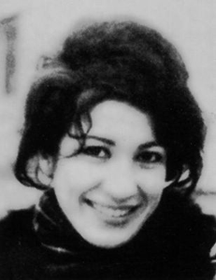An Evening with Forugh: Iranian Poetry Night

Forugh Farrokhzād
Travis's post and recent events call me to describe something I've been wanting to post about for a while. One of the most moving evenings I've had as an American poet occurred in Farsi. It was at the house of close friends born in Iran, who had asked me to join a circle of Iranian-born Mainers who get together once a month simply to appreciate and read and enjoy poetry together.
The night I was there, the focus of the evening was on the work of Forugh Farrokhzād, a beloved Iranian poet. Slides of her life were shown, and we read aloud some of her poems. I was asked to read one of her poems in translation and one of my own. The people in the group were so welcoming and absorbed the poems so deeply, some of them in tears at hearing my poem, that I was overwhelmed in return. None of these people would call themselves poets (though there was one novelist and one translator among them): they were readers and lovers of poetry who work in a great variety of professions from nurse to business executive.
We went around the circle, everyone sharing a poem, more often than not evoking tears and laughter in response. The audience was entirely engaged, and so was I. I have been in many countries where poetry is clearly loved and respected to a degree unknown in the U.S., but this evening was of another order still. Perhaps it was the added bittersweet emphasis of exile, perhaps the deep importance of poetry to Persian culture in particular Once in a while, during a break in the action, someone would kindly translate a snippet for me. But it hardly mattered. I was rapt. During one of these interludes, my translator, a nurse, said to me, "In the U.S., if a person is under stress, they are told to sit in a room and meditate. In our culture, they are told to read poetry."
At the end of the evening, drums and tambourines were brought out and the poetry changed into song. After many hours, I went home deeply moved at the power of poetry to bring people together and to touch us into a place of common humanity. Though I could barely understand a word of what that happened that evening, the evening honestly brought me more joy and a deeper understanding of poetry than many of the evenings I've spent devoted to poetry in English. To be among a group of non-poets who have come together voluntarily so that they can literally laugh and cry over poems is a truly humbling experience for a poet.
I was not surprised when, recently, I read in Meg Bogin's book The Women Troubadours that were it not for Persian poetry, English poetry would have no rhyme; the gift of rhyme came to us from Iran by way of the troubadour poets, through North Africa and into southern Europe. I will never be surprised again by anything I learn about the importance of poetry in Persian culture.
Poem by: Forugh Farrokhzad
Translated by: Sholeh Wolpé
Sky
The Wind will Blow Us Away
Inside my little night, alas,
the wind has a rendezvous with the leaves;
inside my little night, there is fear
and dread of desolation.
Listen.
Hear the darkness blow like wind?
I watch this prosperity through alien eyes.
I am addicted to my despair.
Listen.
Hear the darkness blow?
This minute, inside this night,
something’s coming to pass. The moon
is troubled and red; clouds
are a procession of mourners waiting
to release tears upon this rooftop,
this rooftop about to crumble, to give way.
A moment,
then, nothing.
Beyond this window, the night quivers,
and the earth once again halts its spin.
From beyond this window, the eyes
of the unknown are on you and me.
May you be green, head to toe—
put your hands like a fevered memory in mine…
these hands that love you.
And cede your lips
like a life-warmed feeling
to the caress of my lovesick lips.
The wind will one day blow us away.
The wind will blow us away.
From Sin--Selected Poems of Forugh Farrokhzad, translated by Sholeh Wolpe
Annie Finch is a poet, translator, cultural critic, and performance artist. She is the author of seven volumes of poetry, including Earth Days: Poems, Chants, and Spellsin Five Directions (Nirala Publications, 2023); Eve (Story Line Press, 1997) and Calendars (Tupelo Press, 2003), both finalists for the National Poetry Series; Spells: New...
-
Related Collections
-
Related Articles
- See All Related Content

I recently became a big fan of this blog and thought you and your readers might be interested in another favorite of mine, Narrative Magazine (at http://www.narrativemagazine.com). It offers its contents for free and also accepts all types of submissions (fiction, poetry, art, photography, non-fiction, etc.) Narrative also has a few contests going on now that I think your readers might enjoy. Hope you have a chance to check it out and maybe mention it in your blog or links section!